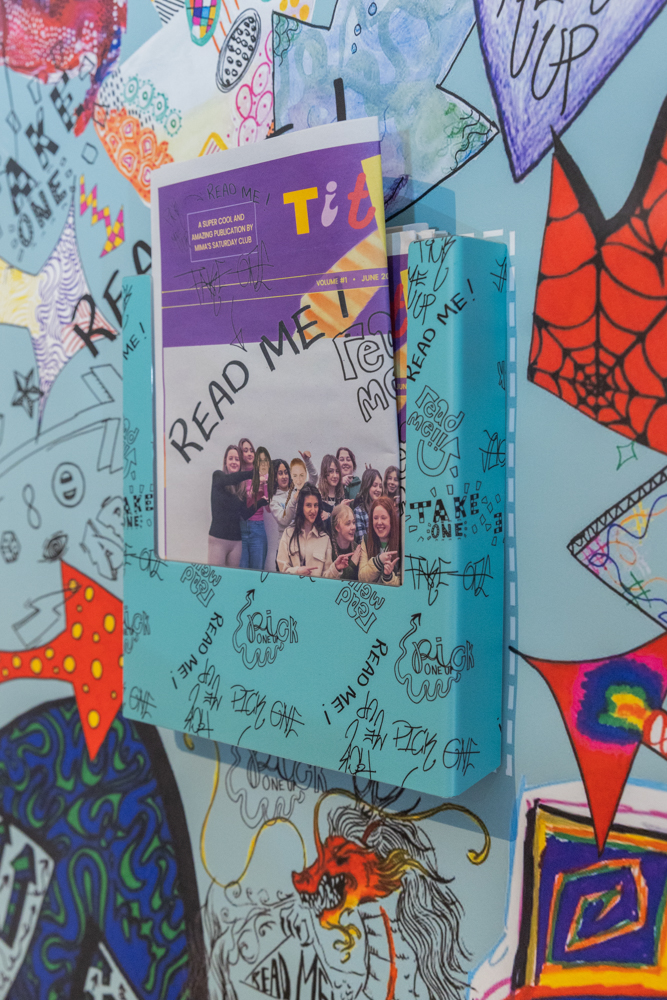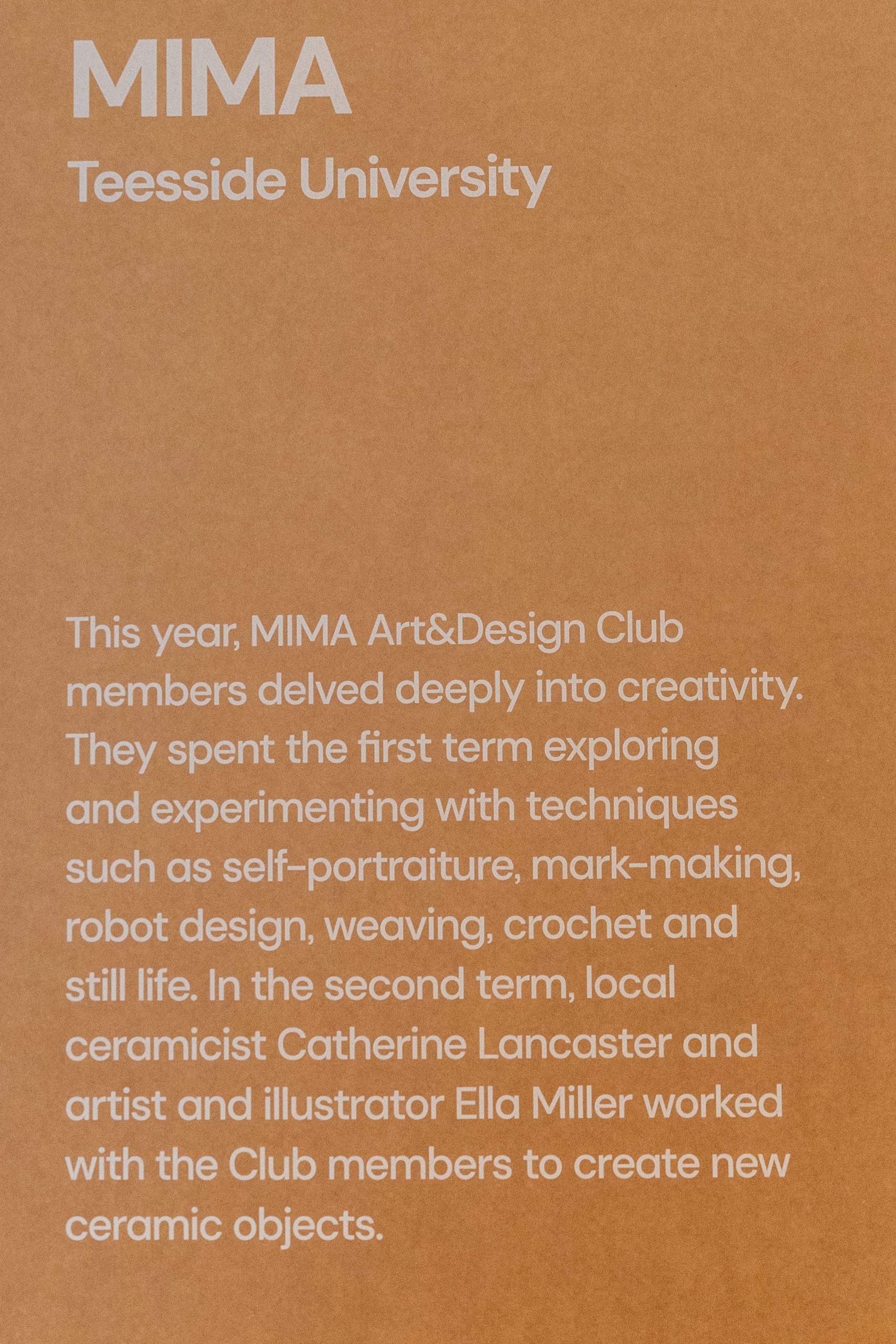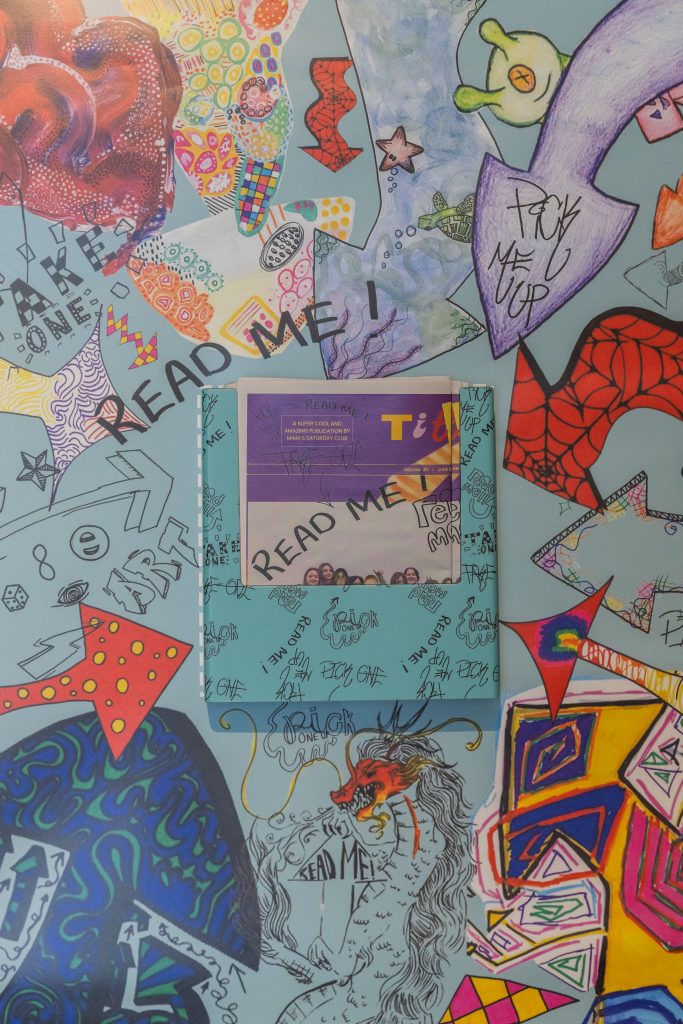Sophie is the Club Coordinator and tutor for the Art&Design Saturday Club at MIMA, Teesside University. Now in its fourth year, the National Saturday Club at MIMA continues to grow under her guidance, with this marking her second year as lead tutor. Sophie also plays a national role as a member of the Tutors’ Advisory Group, helping to inform the programme and organisational development.
In addition to her work with the Saturday Club, Sophie is a Learning Curator at MIMA. Her role enables her to engage with diverse communities across all age groups, creating creativity and inclusion throughout the region.
Sophie trained as an art and design teacher before joining MIMA. She recently completed a two-year term as a Co-opted Governor for a local pupil referral unit – an experience she describes as incredibly rewarding. Committed to continuous learning and leadership, she has recently embarked on an MBA Apprenticeship in Cultural and Creative Leadership at Teesside University, supported by MIMA.
Beyond her professional life, she is a practising artist and musician and shares her home with two beloved rescue cats – Bean, a giant ginger cat, and Daisy, a princess!
Tell us about your Club and your approach to programme planning and curriculum development.
The first term focuses on exploration and experimentation. I introduce our young people to different techniques, materials, and art forms. Coming from a secondary school background, I’ve seen how limiting traditional curriculums can be, so I want to break them out of that mindset early and encourage them to think bigger and build confidence.
The second term is about working with guest artists like Ella Miller, Bobby Benjamin, and Webb-Ellis. These sessions offer new perspectives and methods, from screen printing to abstract portraiture and film. We also worked with spoken word artist Tahmina Ali and textile designer Cassie Quinn.
The final term is for reflection and creating a collaborative final piece for exhibition at MIMA and the National Saturday Club Summer Show. We also guide them through the Art Award Gold qualification, making it feel like a natural part of what they’re already doing.
Why is it important to involve industry experts in the programme?
Introducing Club Members to a range of different artists broadens their understanding of what art can be. Last year we had a debate on “what is art?”, and I encouraged them to form their own opinions.
I invite artists from diverse backgrounds so young people can see themselves reflected in the creative industries. It also helps build confidence – meeting artists, creating their work, and knowing their thoughts are respected. There’s always a point where they want to throw their work away, but I remind them that “mistakes” are part of the process. We even reflect on the environmental impact of waste which lead to conversations about sustainability.
What are the key things you try to achieve for the young people who attend your Saturday Club?
I want young people to leave feeling they’ve genuinely gained something – skills, knowledge of different art forms, and creative confidence.
We challenge the idea that there are no jobs in the arts. It’s vital for them to see different career paths and be connected to real opportunities. One of our alumni did work experience with us and now works with MIMA on a paid basis.
Confidence-building is also key, seeing them grow into a close-knit group is one of the best parts.
And, of course, we also want them to achieve their Arts Award Gold qualification and feel super accomplished! I want to promote a sense of excitement, joy, and wonderment.
How do your personal experiences as a creative feed into the learning environment you create at the Club?
I trained as a teacher, so I have that grounding in pedagogy, but I’ve always felt traditional education can be too rigid. I wanted to build something different, an environment driven by curiosity and creative freedom.
As a working-class artist, I often had to make do with what I had. That adaptability led me to video and sound, and now I pass that attitude on. I tell the young people, “If you try something and don’t like it, that’s not a failure, you’ve learned something.”
For me, being an artist is about thinking creatively and pushing boundaries, not just making things. That’s what I want to share with them.
How do you encourage creative thinking within your Club programme and do you apply what you do at the Club within your other teaching roles?
At MIMA, we use the Philosophy for Children framework, which encourages curiosity and open-ended exploration. I start each session with a playful, thought-provoking question to spark ideas and get everyone talking.
We sit in a circle to create an inclusive space, and from the start, I make it clear that all opinions matter. We focus on questions like, “what does creativity mean to you?” instead of just factual ones.
Another key part of creating a safe and creative space is setting some principles together. This year, we did this by making a group charter that captured what everyone wanted the space to feel like — the atmosphere, what they’d like from me, from each other, and from themselves. We printed it, signed it as a group, and kept it as a reminder of what matters to us. Any visiting artists are also introduced to the charter, so the young people feel their voices shape the space from the start.
Can you share some memorable moments or experiences from your role as a Saturday Club tutor?
One standout moment was when Zora, one of our Club members, earned a place on the National Saturday Club Youth Board. She’s incredibly driven and passionate, she even wrote a piece called ‘Art is important and we must preserve it’ for our Club newspaper.
Another was seeing our Club members exhibit at Pineapple Black Gallery after a successful open call. They were so proud – taking selfies, surrounded by family, and one of them even sold a piece! It helped them see themselves as part of the wider creative community.
Working with Webb-Ellis was also unforgettable. When I saw the final video for their MIMA exhibition featuring our young people’s voices, I was nearly in tears. It’s such a big achievement for them.
There are countless small but meaningful moments in every session – like the deep discussions sparked by a simple question. Every week brings something special, and honestly, I could list a hundred more memories.
What do you see as the key impacts on young people who attend the Saturday Club?
Confidence and opportunity. A lot of our Club members struggle with school or don’t enjoy it, but they still show up to Saturday Club at MIMA every single week. That’s huge! It’s free, it’s accessible, and it offers an alternative approach to education that works for them. That’s why I think the Arts Award Gold qualification is so important, it’s something tangible they can take away from their commitment. I always make a point of telling them how much I appreciate them coming in on a Saturday. They show up, they put the effort in, and I want them to get something valuable from that, whether it’s a qualification that helps them move forward, a deeper understanding of the art forms they love, or just the experience of meeting new people who inspire them.
We’re creating real pathways into the creative industries, work experience at MIMA has already led to paid work for some.
The sense of community is also huge. Young people today are more open around identity and self-expression, and our Club has become a safe space that reflects their values. They’ve formed real friendships and connected with professionals who support them.
Why did you decide to join the National Saturday Club Tutors’ Advisory Group?
Free access to arts education is something I care deeply about. Coming from an underrepresented area, I’ve seen how transformative it can be.
Joining the Tutors’ Advisory Group felt like the perfect way to contribute, not just by bringing up challenges and discussing how we can improve things, but also by learning from others and refining my own approach. It’s not about criticism, but about problem-solving and collaboration, if something isn’t quite working for our young people, how can we make it better?
It’s a space for honest dialogue, and it’s all focused on doing what’s best for the young people we work with. I was thrilled to be offered a place – it’s been an amazing experience so far.



Interview conducted and edited by Suprina Thapa